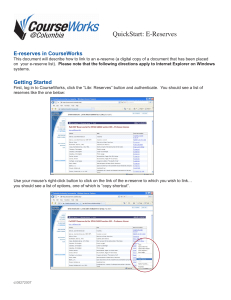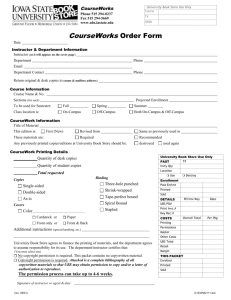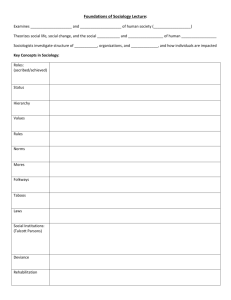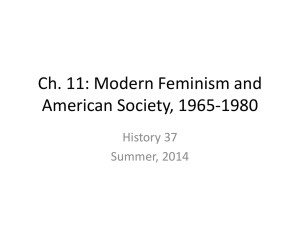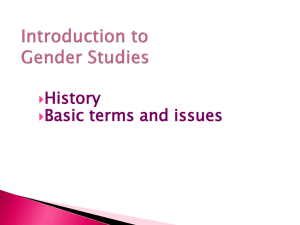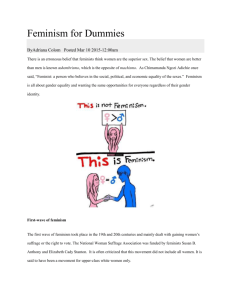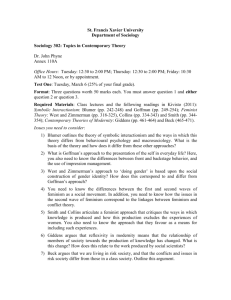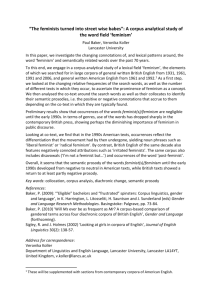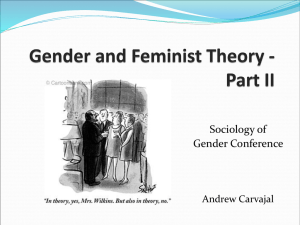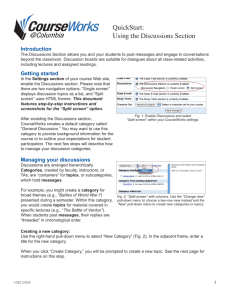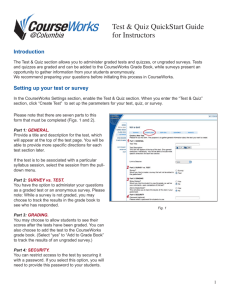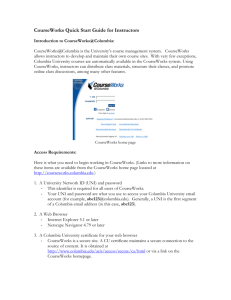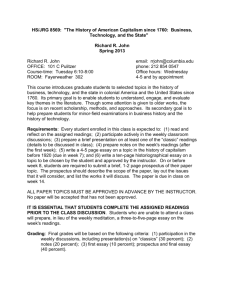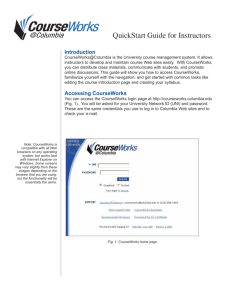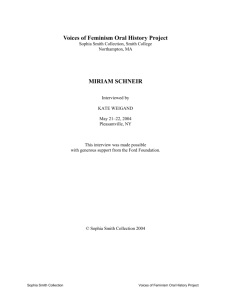History of Philosophy: Aquinas to Kant Christia
advertisement
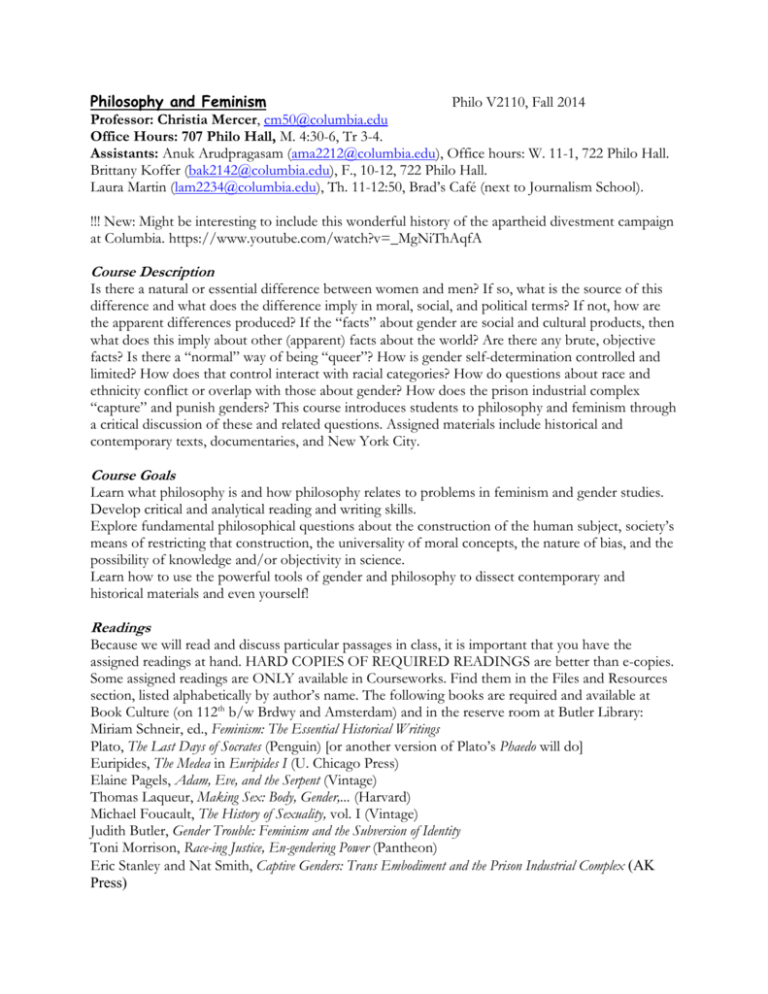
Philosophy and Feminism Philo V2110, Fall 2014 Professor: Christia Mercer, cm50@columbia.edu Office Hours: 707 Philo Hall, M. 4:30-6, Tr 3-4. Assistants: Anuk Arudpragasam (ama2212@columbia.edu), Office hours: W. 11-1, 722 Philo Hall. Brittany Koffer (bak2142@columbia.edu), F., 10-12, 722 Philo Hall. Laura Martin (lam2234@columbia.edu), Th. 11-12:50, Brad’s Café (next to Journalism School). !!! New: Might be interesting to include this wonderful history of the apartheid divestment campaign at Columbia. https://www.youtube.com/watch?v=_MgNiThAqfA Course Description Is there a natural or essential difference between women and men? If so, what is the source of this difference and what does the difference imply in moral, social, and political terms? If not, how are the apparent differences produced? If the “facts” about gender are social and cultural products, then what does this imply about other (apparent) facts about the world? Are there any brute, objective facts? Is there a “normal” way of being “queer”? How is gender self-determination controlled and limited? How does that control interact with racial categories? How do questions about race and ethnicity conflict or overlap with those about gender? How does the prison industrial complex “capture” and punish genders? This course introduces students to philosophy and feminism through a critical discussion of these and related questions. Assigned materials include historical and contemporary texts, documentaries, and New York City. Course Goals Learn what philosophy is and how philosophy relates to problems in feminism and gender studies. Develop critical and analytical reading and writing skills. Explore fundamental philosophical questions about the construction of the human subject, society’s means of restricting that construction, the universality of moral concepts, the nature of bias, and the possibility of knowledge and/or objectivity in science. Learn how to use the powerful tools of gender and philosophy to dissect contemporary and historical materials and even yourself! Readings Because we will read and discuss particular passages in class, it is important that you have the assigned readings at hand. HARD COPIES OF REQUIRED READINGS are better than e-copies. Some assigned readings are ONLY available in Courseworks. Find them in the Files and Resources section, listed alphabetically by author’s name. The following books are required and available at Book Culture (on 112th b/w Brdwy and Amsterdam) and in the reserve room at Butler Library: Miriam Schneir, ed., Feminism: The Essential Historical Writings Plato, The Last Days of Socrates (Penguin) [or another version of Plato’s Phaedo will do] Euripides, The Medea in Euripides I (U. Chicago Press) Elaine Pagels, Adam, Eve, and the Serpent (Vintage) Thomas Laqueur, Making Sex: Body, Gender,... (Harvard) Michael Foucault, The History of Sexuality, vol. I (Vintage) Judith Butler, Gender Trouble: Feminism and the Subversion of Identity Toni Morrison, Race-ing Justice, En-gendering Power (Pantheon) Eric Stanley and Nat Smith, Captive Genders: Trans Embodiment and the Prison Industrial Complex (AK Press) 2 Assignments Your primary goal is to read and think about the assigned materials. This means coming to class prepared! One in-class exam; two two-page papers; one 4-page double-spaced paper Final examination Posts on Gender/Feminist Topics: 10 posts over the semester. Each post roughly 200 words. Posts should include Romare Bearden’s Black Odyssey, the Metropolitan Museum Assignment, Bedlam’s production of Sense and Sensibility (Artslink event). They could include a couple of the following: Homer in Harlem Event, September 26, 3:00 and a “Gendered Futures” discussion. Your TA will write about how to submit posts. Grades One in-class exam = 10%, Two two-page papers, each = 12.5% for total of 25% One four-page paper = 25% Posts = 10% Final Exam = 20% Academic Honesty The CC honor code is: “I affirm that I have not plagiarize, use unauthorized materials, or give or receive illegitimate help on assignments, papers, and examinations. I will also uphold equity and honesty in the evaluation of my work and the work of others. I do so to sustain a community built around this Code of Honor.” You are REQUIRED to write this on the back of all submitted work. We will not grade your work unless it includes this statement. Plagiarism or other forms of cheating will lead to failure of the course. Plagiarism includes using phrases copied from online sources without citation. We have zero-tolerance. Lecture Topics and Readings A. Essentialism: A Philosophical and Historical Perspective Week 1 Introduction to Course 9/2: Introduction The Origins of Female-Male Essentialism. 9/4: Reading: Plato´s Phaedo in The Last Days of Socrates (another edition of the Phaedo is fine). Week 2: Reason, Passion, Agency in Ancient Athens and Early Christianity 9/9: Euripedes, The Medea 9/11: Reading: Pagels’ Adam, Eve, and the Serpent, ch. 1 (all), ch. 2 (pp. 32-43), ch. 3 ( 64-77). Week 3 Women’s Souls, Bodies, and Virtue 9/16: Reading: Pagels’ Adam, Eve, ch. 4 (all), ch. 6 (all). 9/18: Reading in Schneir, Feminism: Wollstonecraft (pp. 5-16); Grimke (pp. 35-48); Sojourner Truth, pp. 92-98. 3 Week 4: Bodies, Property, Power 9/23: Reading: in Schneir, Feminism: Goldman (308-24); Engels (pp. 189-204). 9/25: In-class Exam Homer in Harlem Event, September 26, 3:00 pm, The Sirens’ Song: Women and Gender in Bearden and Homer, A discussion with Anjuli Kolb, Brooke Holmes, Rachael DeLue, Marcellus Blount, Farah Jasmine Griffin, and Helene Foley, Columbia University, Buell Hall, East Gallery, 1172 Amsterdam Avenue B. Essentialism: Construction, Discourse, Power, and Critique Week 5 Desire, Discourse, and Power. 9/30: Reading: Foucault, History of Sexuality, Parts 1, 2; Norimitsu Onishi NYT, Global Beauty, October 3, 2002. 10/2: Foucault, History of Sexuality, Part 3 First Paper Assignment Distributed. Week 6 Constructing Sexual Difference. 10/7: Reading: Laqueur’s Making Sex, ch. 1-2, 3 (quick read w/ special attention on pp. 69, 82, 88, 98-99). 10/9: Reading: Laqueur, ch.5 (pp. 149-63), ch.6 (pp. 193-207; 243). Week 7 Constructing Gender 10/14-16: Reading: Butler, Gender Trouble, preface, ch. 1, ch. 3 (Read from beginning of Concluding Unscientific Postscript to end). Week 8 The Normal, Shame, and Illness FIRST PAPER DUE by 1:00 Monday, 10/20 10/21: Reading: Michael Warner, The Trouble with Normal, chs. 1, 2, 3, and pp. 142-54. Courseworks. 10/23: Guest Lecture: Joey Shemuel (CC ’11). Reading: chaps 6, 7, 8 (to p. 174) or Susan Sontag, AIDS and Its Metaphors, 1989, see Courseworks. Meet and discuss with Joey that evening, 754 Schermerhorn Extension, 6-& 7:30. C. Race, Gender, and Power Week 9 Race, Gender, and Being Seen. 10/28: Anita Hill Made Invisible Assignment: Documentary, Frontline: “Clarence Thomas, Anita Hill: Public Hearing, Private Pain” (1992). Reading: in Morrison, Race-ing Justice, articles by Higginbotham, Marable, Painter; and J. Morgan, "Some Could Suckle over Their Shoulder: Male Travelers, Female Bodies, and the Gendering of Racial Ideology, 1500-1770” in Courseworks. 10/30: Seeing Women of Color Assignment: Documentary: Anita (2013). Reading: in Morrison, Race-ing Justice, articles by Stansell, Lubiano, Crenshaw; also read Kathryn T. Gines, “Black Feminism and Intersectional Analysis” in Courseworks; and about “My Brother’s Keeper Initiative” by Kimberlé Williams Crenshaw: “My Brother’s Keeper Ignores Young Black Women, NY Times, July 29, 2014 Op-Ed.” See http://www.nytimes.com/2014/07/30/opinion/Kimberl-Williams-Crenshaw-My-Brothers-KeeperIgnores-Young-Black-Women.html?_r=0 4 D. Gender, Confinement, and the Prison Industrial Complex Week 10 Confinement and the Body 11/4: NO CLASS (Election Day) ASSIGNMENT: Vote!! 11/6: Required: Angela Davis on the Prison Industrial System at: https://www.youtube.com/watch?v=IKb99K3AEaA Recommended: https://www.youtube.com/watch?v=AxCqTEMgZUc Reading: Stanley/Smith, Captive Genders, Intro (pp. 1-14) and chapters entitled: “Building an Abolitionist … Movement” (pp. 15-40); “Street Power and the Claiming of Public Space” (41-56). Second Paper Assignment Distributed Week 11 Punishment and Desire 11/11: Reading: Stanley/Smith, Captive Genders, chapters entitled: “Rounding Up the Homosexuals” (pp. 77-84); “Regulatory Sites” (99-112); “Awful Acts and the Trouble with Normal” (pp. 113-40); “Identities Under Siege,” (pp. 141-64); “My Story” (pp. 209-114). 11/13: Guest Lecture: Emma Kaufman (CC ’08). Reading: Kaufman, Punish and Expel: Border Control, Nationalism, and the New Purpose of the Prison, chapter 7 in Courseworks. Meet and discuss with Emma that evening. E. Gender, Objectivity, and Science SECOND PAPER DUE by 4:00 Monday, Nov. 17th Week 12 Feminism, Objectivity, and Knowledge 11/18 Reading: Langton (ch. 7 of Cambridge Companion), Courseworks 11/20 Fricker (ch.8), and Wylie (ch. 9), Courseworks Tour of Romare Bearden’s Black Odyssey Final Paper Assignment Distributed Metropolitan Museum Tour, Weekend of 11/22 Week 13 Feminism and Nature. 11/25: Haslanger (ch.6 of Cambridge Companion/Courseworks); Lloyd, “Objectivity and the Double Standard”(Pay special attention to the first two sections and the last section, Courseworks). 11/27: NO CLASS (Thanksgiving) Week 14 Essentialism Revisited//Conclusions 12/2: Bad Science and Essentialism Revisited Reading: Wikipedia article, Rape and pregnancy controversies in United States elections, 2012; Time Magazine, “The Most Important Sex Organ” in Courseworks. 12/4: Conclusion and Review Final PAPER DUE at 4:00, Friday, December 12. REMEMBER: 3 hour final exam during exam period. 5
